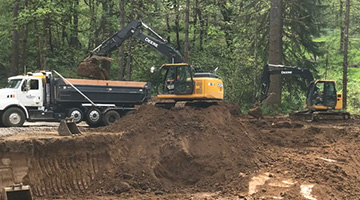Lancaster Excavation - Specialist Excavation Solutions in Lancaster, OH
Lancaster Excavation - Specialist Excavation Solutions in Lancaster, OH
Blog Article
Comprehensive Excavation Approaches: Mastering the Principles for Success
In the world of building and civil engineering, the significance of effective excavation techniques can not be overemphasized. The mindful planning, accurate execution, and precise focus to information called for in excavation jobs require an extensive technique that incorporates numerous essential elements. From first dirt evaluation to the execution of precaution and routine progression monitoring, grasping these core components is vital for accomplishing success in any excavation undertaking. However, the true mastery lies not merely in comprehending these basics however in effortlessly incorporating them to browse the complexities of excavation tasks with skill.
Comprehending Excavation Project Preparation

The initial phase of any kind of excavation project is the preparation stage, where crucial decisions are made that can considerably impact the result of the project. Comprehending the project scope, budget, and timeline constraints is vital for developing a comprehensive excavation plan that ensures the job's success.
One secret element of excavation task planning is the development of an in-depth timeline that details the series of landmarks, tasks, and target dates. This timeline acts as a roadmap for the project group, allowing them to track progress and make essential changes to guarantee the project remains on timetable. Furthermore, a well-defined budget plan that represents all expenses, consisting of devices rental, labor costs, and materials, is essential for staying clear of expense overruns and hold-ups. By meticulously considering all these variables during the drawing board, excavation tasks can be carried out efficiently and properly, leading to successful end results.
Dirt Analysis and Website Examination
Carrying out thorough soil evaluation and website analysis is a vital action in the preparation stage of any type of excavation task. Dirt analysis involves determining the make-up, framework, and residential properties of the dirt at the excavation website. This information is critical for understanding the soil's bearing capacity, wetness content, and potential for erosion, which are key consider determining the excavation methods and equipment needed for the project.
Site evaluation goes beyond soil analysis and includes a wider evaluation of the overall site conditions. This assessment includes determining any kind of prospective hazards, such as below ground energies, ecological worries, or unsteady terrain, that might affect the excavation process. By thoroughly assessing the website, task supervisors can establish efficient excavation techniques that focus on safety, performance, and environmental management.
Making use of advanced innovations like ground-penetrating radar, soil sampling, and drone studies can improve the accuracy and effectiveness of soil analysis and website examination. Spending time and sources in these preliminary steps can ultimately conserve time and stop costly hold-ups or complications during the excavation procedure.
Devices Option and Use
Effective excavation projects rely heavily on strategic devices selection and application to make sure optimum performance and efficiency. Selecting the right tools for the work is essential in making the most of performance and lessening downtime. Variables such as the kind of soil, deepness of excavation, and task extent play a significant duty in identifying one of the most appropriate devices for the task at hand.

In addition to choosing the proper tools, proper usage is essential to visit this site project success. Operators has to be educated to handle the devices safely and successfully - excavating ohio. Routine upkeep checks and timely repair services assist protect against break downs and make sure constant performance throughout the project
Precaution and Laws Compliance
In the realm of excavation projects, prioritizing security steps and conformity with regulations is paramount to ensuring a protected and legally sound functional atmosphere. Precaution encompass a variety of methods, consisting of carrying out complete website evaluations, carrying out proper signage and barriers, and giving ample safety and security training for all personnel associated with the excavation process. Adherence to regulations, such as OSHA demands in the United States, makes sure that the excavation task meets the essential requirements to safeguard workers, onlookers, and the surrounding atmosphere.

Tracking Progression and Adjusting Techniques
Exactly how can forecast supervisors successfully track the improvement of excavation projects and adjust their approaches accordingly to maximize end results? Tracking progress is essential for making sure that excavation jobs stay on track and fulfill target dates. Task managers can use numerous devices and methods to track development, such as daily report card, normal site examinations, and advanced monitoring innovations like drones and general practitioners tracking systems. By constantly checking the job's improvement, managers can determine any possible delays or problems early on and take aggressive measures to address them.

Conclusion
In final thought, grasping the principles of comprehensive excavation strategies is necessary for the success of any type of task. By recognizing project preparation, analyzing soil and website conditions, picking proper equipment, following safety guidelines, and keeping track read this post here of progression, project managers can ensure a efficient and smooth excavation procedure. Applying these strategies will certainly bring about successful end results and decrease possible risks or problems during the excavation project.
The initial stage of any kind of excavation job is the planning stage, where critical decisions are made that can considerably affect the end result of the job. Recognizing the project spending plan, timeline, and range constraints is crucial for developing a detailed excavation plan that guarantees the project's success.
Exactly how can forecast supervisors properly track the advancement of excavation tasks and adapt their techniques appropriately to maximize results? By carefully keeping track of development and being willing to adjust approaches, task managers can enhance the overall success of excavation tasks.
By comprehending project planning, analyzing soil and website problems, selecting suitable equipment, complying with safety policies, and monitoring progress, job managers can ensure a reliable and smooth excavation process.
Report this page